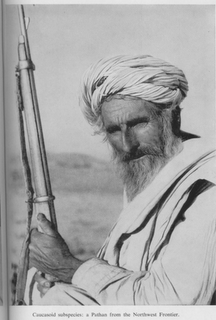
A new article in European Journal of Human Genetics investigates the Greek ancestry of Pakistani populations that sometimes claim descent from Alexander the Great's troops. In previous studies (use search on the right) it was demonstrated that these claims are mostly false, since modern Pakistanis mostly lack haplogroup E3b chromosomes that are found often in Greece.
The new study shows that among the Pakistani populations, only the Pathans seem to be closer to the Greeks, and not the pagan Kalash and the Burusho. Unfortunately, claims about the Hellenicity of the Kalash seem to persist despite the genetic evidence that has accumulated over the years.
Moreover, the similarity between the Pathans and the Greeks is not accidental. An argument for the real contribution of Greeks to the Pathan population is the discovery of specific haplotypes within haplogroup E3b1 that seem to be of Greek-Balkan origin and which are found only in the Pathans among the Pakistani populations.
Compelling evidence in support of the genetic relationship between the Pathan and Greek E3b1 Y chromosomes was provided by the median-joining network (Figure 4). One Pathan shared a Y-STR haplotype, that included a duplication of 10 and 13 repeat units for the DYS425 locus, with three Greek individuals and the other was separated from this cluster by a single mutation, which enabled us to estimate the TMRCA (mean+/-SD) using the Network software as between 2000+/-400 and 5000+/-1200 YBP depending upon the observed26 or inferred mutation rates,27 respectively. This coincides with the period of Alexander's invasion during 327–323 BC. This haplotype was not observed in any other E3b1-derived Pakistani Y chromosome but was highly specific for the Balkans – the highest frequency being in Macedonia.European Journal of Human Genetics (advance online publication)
Y-chromosomal evidence for a limited Greek contribution to the Pathan population of Pakistan
Sadaf Firasat et al.
Three Pakistani populations residing in northern Pakistan, the Burusho, Kalash and Pathan claim descent from Greek soldiers associated with Alexander's invasion of southwest Asia. Earlier studies have excluded a substantial Greek genetic input into these populations, but left open the question of a smaller contribution. We have now typed 90 binary polymorphisms and 16 multiallelic, short-tandem-repeat (STR) loci mapping to the male-specific portion of the human Y chromosome in 952 males, including 77 Greeks in order to re-investigate this question. In pairwise comparisons between the Greeks and the three Pakistani populations using genetic distance measures sensitive to recent events, the lowest distances were observed between the Greeks and the Pathans. Clade E3b1 lineages, which were frequent in the Greeks but not in Pakistan, were nevertheless observed in two Pathan individuals, one of whom shared a 16 Y-STR haplotype with the Greeks. The worldwide distribution of a shortened (9 Y-STR) version of this haplotype, determined from database information, was concentrated in Macedonia and Greece, suggesting an origin there. Although based on only a few unrelated descendants, this provides strong evidence for a European origin for a small proportion of the Pathan Y chromosomes.
Link

No comments:
Post a Comment